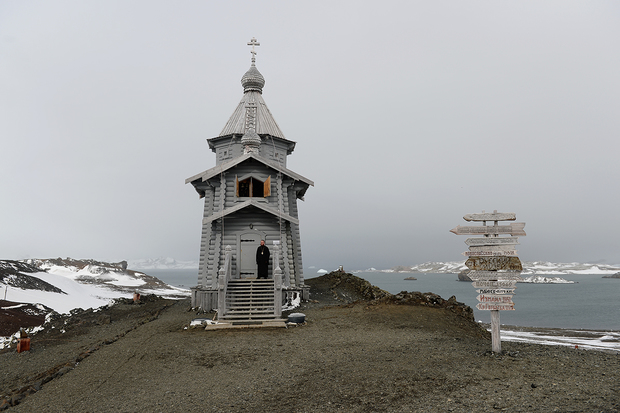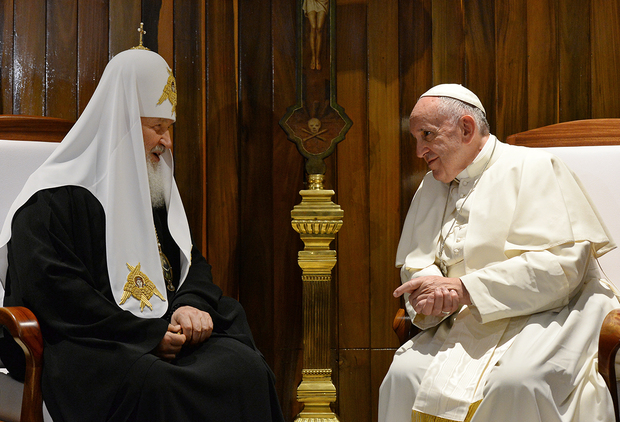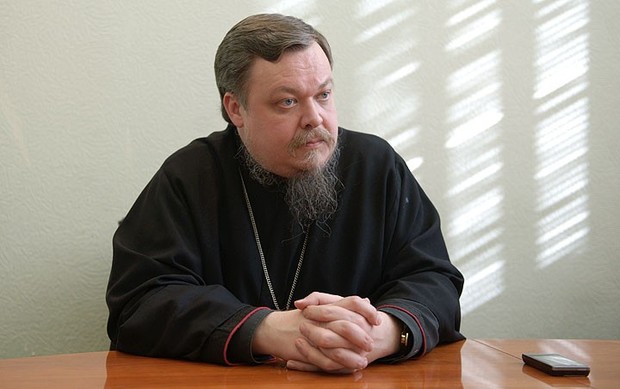‘Many people were amazed with Patriarch and a penguin photo. They are a part of the beauty created by God’
Vsevolod Chaplin, the former chairman of the Synodal Department for the Cooperation of Church and Society of the Moscow Patriarchate — about penguins, the reunion of the Churches and new villages for pacifists
Protoiereus Vsevolod Chaplin tells in his column about Patriarch of Moscow and all Rus Kirill's tour to Latin America, visit to Antarctica and a meeting with the Bishop of Rome. In particular, he indicates in what aspects this two world faiths converge and in what they differ at the present stage.
Catholics have moved out
His Holiness Patriarch Kirill's visit to Latin America has provoked expected discussion in media and blogs. Many people were amazed by Patriarch and a penguin photo. But the penguins are the part of the beauty created by God. Why don't look at them? Politicians and other famous people in Antarctica have been there for many times, and took a photo with penguins too, and, believe me, there was no sin, as in visiting exotic birds by the Primate of the Russian Church.
However, Patriarch Kirill came to Antarctica, first of all, to people, members of the polar expedition who invited him. By the way, only Russian Church among other Orthodox Churches of the world has its temple there. I suppose, constantly serving Russian shepherd there – is a unique phenomenon in the Christian world. Last year, Catholic priests, spending summer months in the Antarctic, were forced to shut down its mission because of lack of funds of the inviting National Science Foundation of the USA. Our Church is the only one that serves in all continents without exception. It serves people, not penguins, although they beautify the routine of Orthodox Christians in the Antarctica – those romantics who are ready to work far from their homes, in the other part of the planet.

Only Russian Church among other Orthodox Churches of the world has its temple there. I suppose, constantly serving Russian shepherd there – is a unique phenomenon in the Christian world
'Left-wing' ideologemes of the Churches
More serious was the discussion of the meeting of Patriarch Kirill with Bishop of Rome Francis and the signed joint statement. Almost no one has any objection to 'political' paragraphs of the document. The positions of the Russian Orthodox and Roman Catholic Churches on global social issues are very close, to the degree of similarity. It was particularly evident during the years of the pontificate of Pope Francis, who focused on criticism of the global economic system and who greatly differs from some Western 'axioms'. The Primates of the two Churches sent a clear signal that Christians should not ignore societal problems.
'Human civilization,' said in the statement, 'entered a period of epochal changes. The Christian conscience and pastoral responsibility not allow us to remain indifferent to the challenges requiring a joint response. <…> Growing inequality in the distribution of earthly goods increases the sense of injustice of imposed system of international affairs.'
Catholic but a radical 'left' Cuba has become a perfect platform to express such thoughts, especially because traditional Christian Churches, including the 'old' Protestant ones – Lutherans, Reformed, Presbyterians, — are using the 'left-wing' ideologemes almost in unison.

The rhetoric of non-violence, which the Catholic Church inclines to, actually has little in common with traditional Christianity. Pacifism is lifeless and does not take into account the realities of our world tainted by sin
Pacifism is lifeless
The Pope and the Patriarch condemned the terror in the Middle East, but in the joint paper the forceful opposition to 'the plague of the XXI century' was omitted. The Patriarch had to specify his position in the interview immediately after the meeting:
'It is obvious that it is impossible to talk with terrorism only at the level of dialogue and verbal persuasion — we need to use force. <…> And as they act violently, the response to these actions of all those who are interested in preserving not only the Christian presence, but peace in general in these places, should use force.'
The rhetoric of non-violence, which the Catholic Church inclines to, actually has little in common with traditional Christianity. Pacifism is lifeless and does not take into account the realities of our world tainted by sin. By the way, I have been offering for a long time to give the pacifists a lovely piece of land somewhere in the resort area of Africa or the Middle East – and give them the opportunity finally to build a state (or non-state) without an army and police…
Claim of the truth
Much more difficult was the discussion about the purely religious elements of the joint statement and the meeting itself. There are priests who speak out like that: 'Another obstacle to the imposition of Catholicism of the Orthodox Church has been eliminated. But let us not lose heart, dear brothers and sisters! We have the promise of Coming King. He will bring order in the Russian Land and cleanse the Church from heretics.'
Some people ask: do the embraces and the expression 'two Churches' mean that the Orthodox should admit the Catholic Church is the true Church?

'If you look at things pragmatically, it is easy to see that the information age demands a short, clear, unambiguous message. Contrary to talks about the triumph of tolerance and relativism, a clearly expressed claim of the truth is more popular.' Photo: rbc.ru
And here one of the central questions for modern religious thought arises with special urgency: can two Churches or a whole bunch of religious communities be true at the same time? Are two teachings about God equally correct, if they disagree – even a little? Let's leave the question about the differences of Orthodox and Catholics for internal Church debate – and such differences are not only in the area of long-standing disputes about the Procession of the Holy Spirit, but in the sphere of spiritual and prayer practice.
If you look at things pragmatically, it is easy to see that the information age demands a short, clear, unambiguous message. Contrary to the talks about the triumph of tolerance and relativism, a clearly expressed claim of the truth is more popular. Politically correct words based on the fears to offend anyone 'do not touch'. That's why the future belongs to documents that are not compromise, but very straight and missionary. Without any regard to 'a parallel reality'. With such message they should go to the people – not only in Antarctica, but in Kiev, in the Donbass, the Middle East, to Western Europe.
Reference
Vsevolod Anatolyevich Chaplin – the priest of the Russian Orthodox Church, protoiereus; rector of St. Nicholas on the Three Hills Church, Moscow. Candidate of Theology.
He was born in 1968 in Moscow to the family of a professor Anatoly Chaplin.
After he finished secondary education in 1985, he joined the staff of the Publishing Department of the Moscow Patriarchate. He entered the Moscow Theological Seminary, graduating in 1990.
From October 1990 to March 2009, he was in the Department for External Church Relations (DECR) of the Moscow Patriarchate.
He was elevated to archpriest in 1999.
From 2009 to 2015 – chairman of synodal department for the Cooperation of Church and Society of the Moscow Patriarchate.
A presenter of the programme Vremya Doveriya on Radio Komsomolskaya Pravda. Constantly published in the newspaper Rus Derzhavnaya.
The author of several fictions under the pseudonym Aaron Chamier.